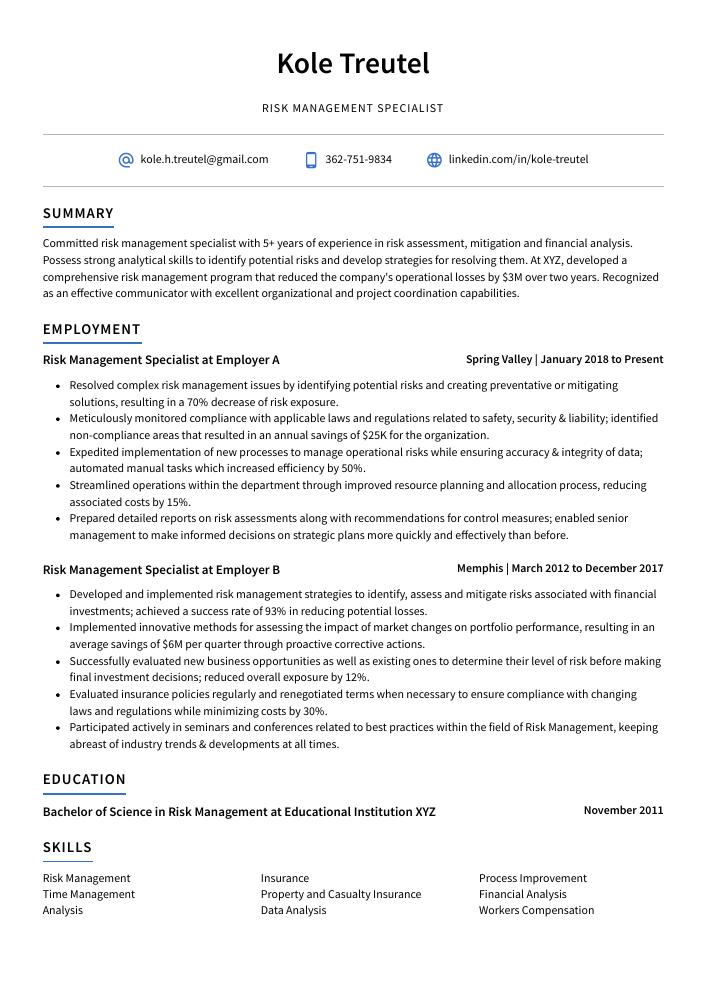Risk Management Specialist Resume Guide
Risk management specialists analyze potential risks to an organization and develop strategies to reduce or eliminate those risks. They review current processes, evaluate financial data, monitor regulatory changes, and create contingency plans for unexpected events. Additionally, they may provide guidance on insurance coverage options that can help protect their company from losses related to certain types of risk.
Risk management is your forte, and you know how to minimize the chances of financial losses. But employers don’t know who you are yet – so create a resume that shows off your expertise in this area and grabs their attention.
This guide will walk you through the entire process of creating a top-notch resume. We first show you a complete example and then break down what each resume section should look like.
Table of Contents
The guide is divided into sections for your convenience. You can read it from beginning to end or use the table of contents below to jump to a specific part.
Risk Management Specialist Resume Sample
Kole Treutel
Risk Management Specialist
[email protected]
362-751-9834
linkedin.com/in/kole-treutel
Summary
Committed risk management specialist with 5+ years of experience in risk assessment, mitigation and financial analysis. Possess strong analytical skills to identify potential risks and develop strategies for resolving them. At XYZ, developed a comprehensive risk management program that reduced the company’s operational losses by $3M over two years. Recognized as an effective communicator with excellent organizational and project coordination capabilities.
Experience
Risk Management Specialist, Employer A
Spring Valley, Jan 2018 – Present
- Resolved complex risk management issues by identifying potential risks and creating preventative or mitigating solutions, resulting in a 70% decrease of risk exposure.
- Meticulously monitored compliance with applicable laws and regulations related to safety, security & liability; identified non-compliance areas that resulted in an annual savings of $25K for the organization.
- Expedited implementation of new processes to manage operational risks while ensuring accuracy & integrity of data; automated manual tasks which increased efficiency by 50%.
- Streamlined operations within the department through improved resource planning and allocation process, reducing associated costs by 15%.
- Prepared detailed reports on risk assessments along with recommendations for control measures; enabled senior management to make informed decisions on strategic plans more quickly and effectively than before.
Risk Management Specialist, Employer B
Memphis, Mar 2012 – Dec 2017
- Developed and implemented risk management strategies to identify, assess and mitigate risks associated with financial investments; achieved a success rate of 93% in reducing potential losses.
- Implemented innovative methods for assessing the impact of market changes on portfolio performance, resulting in an average savings of $6M per quarter through proactive corrective actions.
- Successfully evaluated new business opportunities as well as existing ones to determine their level of risk before making final investment decisions; reduced overall exposure by 12%.
- Evaluated insurance policies regularly and renegotiated terms when necessary to ensure compliance with changing laws and regulations while minimizing costs by 30%.
- Participated actively in seminars and conferences related to best practices within the field of Risk Management, keeping abreast of industry trends & developments at all times.
Skills
- Risk Management
- Insurance
- Process Improvement
- Time Management
- Property and Casualty Insurance
- Financial Analysis
- Analysis
- Data Analysis
- Workers Compensation
Education
Bachelor of Science in Risk Management
Educational Institution XYZ
Nov 2011
Certifications
Certified Risk Management Professional
Global Risk Management Institute
May 2017
1. Summary / Objective
A resume summary for a risk management specialist should emphasize your ability to identify, assess and mitigate risks. Include key skills such as knowledge of regulatory compliance, financial analysis, data mining and analytics. Also mention any certifications or qualifications you have obtained in the field of risk management. Finally, highlight how you have successfully identified potential risks and implemented strategies to reduce them at previous employers.
Below are some resume summary examples:
Talented risk management specialist with 7+ years of experience in developing and implementing risk mitigation strategies for financial institutions. Skilled at identifying key risks, assessing potential impacts, analyzing data to support decisions, and delivering comprehensive solutions that increase organizational efficiency and compliance. Experienced in managing complex projects within strict budgets while maintaining a high quality standard.
Energetic risk management specialist with 5+ years of experience in the financial services industry. Proven ability to identify, assess and mitigate risk across multiple business operations. Committed to developing effective strategies that reduce potential losses while upholding regulatory compliance standards. Seeking a position at ABC Bank where I can apply my expertise in risk analysis and develop innovative solutions for complex issues.
Skilled risk management specialist with 8+ years of experience in assessing, analyzing and mitigating various types of business risks. Experienced in developing effective risk management policies, procedures and programs to ensure compliance with applicable laws & regulations. At ABC Corporation, developed a comprehensive enterprise-wide risk management system that has been used as the model for other companies throughout the industry.
Seasoned risk management specialist with 10+ years of experience in the financial services industry. Proven ability to develop and execute strategies that minimize operational risks while maximizing returns on investments. Key achievements include implementing a risk measurement system that reduced market losses by 20%. Looking to join ABC’s team as a senior risk manager, where I can continue my success in this field.
Reliable risk management specialist with 5+ years of experience in developing and implementing risk assessment strategies for organizations. At XYZ, introduced new approaches to minimize organizational losses by identifying potential risks and designing mitigation plans. Proven track record of successfully resolving financial discrepancies and reducing unnecessary spending through effective cost-benefit analysis.
Amicable risk management specialist with 5+ years of experience in financial services. Diligent, organized professional with a track record of successfully implementing risk mitigation strategies and procedures to minimize exposure to losses. At ABC Financial Services, identified 20% cost savings by streamlining internal processes while maintaining high standards for compliance and regulatory requirements.
Determined and organized risk management specialist with a proven track record in developing and implementing effective strategies to monitor, control, and mitigate risks. At XYZ Corporation saved $2 million by identifying potential losses before they occurred. Adept at analyzing financial data to identify areas of vulnerability within the organization and develop appropriate solutions for each situation.
Diligent risk management specialist with 5+ years of experience identifying, evaluating, and mitigating financial risks for large companies. Previously reduced credit risk exposure by 25% through strategic policy implementation at XYZ Corporation. Seeking to join ABC Company as a Risk Management Specialist in order to help drive operational excellence and enhance the company’s bottom line performance.
2. Experience / Employment
In the experience section, you provide details on your employment history. This should be written in reverse chronological order, meaning the most recent role is listed first.
When writing this section, stick to bullet points and include as much detail as possible about what you did and the results achieved. For example, instead of saying “Identified risks,” you could say “Conducted a risk assessment for all operations within the company that identified potential threats and vulnerabilities; implemented mitigating strategies which reduced overall risk by 25%.”
To write effective bullet points, begin with a strong verb or adverb. Industry specific verbs to use are:
- Assessed
- Analyzed
- Mitigated
- Evaluated
- Identified
- Monitored
- Developed
- Implemented
- Reported
- Investigated
- Resolved
- Documented
- Communicated
- Tracked
- Managed
Other general verbs you can use are:
- Achieved
- Advised
- Compiled
- Coordinated
- Demonstrated
- Expedited
- Facilitated
- Formulated
- Improved
- Introduced
- Mentored
- Optimized
- Participated
- Prepared
- Presented
- Reduced
- Reorganized
- Represented
- Revised
- Spearheaded
- Streamlined
- Structured
- Utilized
Below are some example bullet points:
- Mentored a team of 8 risk analysts in effectively evaluating and mitigating financial, operational & compliance risks; helped decrease the overall risk exposure by 25%.
- Managed a comprehensive review of existing processes to identify any potential areas for improvement or optimization; identified over $500,000 worth of cost savings through process enhancements.
- Accurately identified trends & patterns within large datasets utilizing advanced analytics techniques, resulting in improved accuracy and reliability of results by 15%.
- Investigated claims filed with insurance companies regarding loss adjustments and provided thorough documentation on findings; slashed claim resolution time from an average 4 weeks to 2 weeks per case.
- Reduced company’s total losses due to fraud cases by 20%, implementing innovative measures such as internal control reviews and employee training sessions focusing on prevention strategies.
- Formulated comprehensive risk management plans to identify, assess and monitor potential risks; successfully reduced the impact of unexpected events by 35%.
- Spearheaded the implementation of a new framework for analyzing corporate financial data to pinpoint areas vulnerable to economic instability; identified over $4 million in cost savings opportunities.
- Consistently monitored market trends, regulations and compliance standards related to risk management activities within the organization; pushed through changes that improved processes by 30%.
- Advised executives on best practices for mitigating both operational and financial risks associated with organizational decisions; developed protocols that resulted in a 20% decrease in liabilities year-over-year.
- Reorganized internal policies pertaining to due diligence procedures, capital allocation strategies & governance frameworks across multiple departments, reducing overall exposure time from 4 days down to 2 days on average.
- Mitigated risk exposure by identifying, analyzing and evaluating potential external threats to the organization’s operations; reduced risk levels by 25%.
- Resourcefully identified process improvements, drafted new policies & procedures and provided constructive feedback on existing practices to minimize risk-related incidents.
- Documented findings after assessing risks associated with different projects in order to strengthen information security protocols and protect confidential data assets.
- Compiled detailed reports summarizing the results of various analyses conducted over financial portfolios, investments or other products for senior executives’ review.
- Tracked changes in compliance regulations as well as relevant developments within the industry landscape and efficiently updated all related documentation accordingly +20% faster than expected timeline set out originally.
- Represented the organization in key risk management projects, successfully identifying and mitigating potential risks to minimize financial losses by 15%.
- Facilitated regular training sessions for board members & staff on the latest developments in risk management legislation; provided expert guidance on various compliance issues.
- Reliably monitored daily operations of business units across 3 countries, ensuring adherence to safety protocols and regulatory requirements with zero violations or penalties incurred over a 2-year period.
- Achieved significant cost savings through successful implementation of innovative strategies that reduced operational risks while increasing overall efficiency by 12%.
- Improved organizational preparedness against threats such as cybercrime & fraud via rigorous reviews of existing policies and procedures; achieved 99% accuracy rate in data security checks within 6 months.
- Identified and evaluated key risk areas, potential exposures and mitigating strategies to minimize financial losses; reduced overall business risk by 25% in the last quarter.
- Monitored current investment portfolios and assessed future obligations for more than 40 clients, providing accurate recommendations on how best to address any risks posed.
- Analyzed project plans, organizational processes and external market factors to identify potential vulnerabilities in business operations; effectively managed compliance with government regulations across all departments.
- Structured internal policies & procedures related to information security, data privacy & disaster recovery management that substantially increased cyber security levels within the organization by 80%.
- Substantially upgraded company-wide risk management systems through automation of manual tasks such as tracking insurance contracts, monitoring credit ratings & processing audit reports; successfully streamlined daily operations by 2 hours per day on average.
- Optimized existing risk management processes and protocols, resulting in a 25% decrease in the company’s exposure to financial loss.
- Demonstrated expertise in analyzing data from various sources to identify potential risks; conducted over 300 detailed assessments within 12 months.
- Reported key findings on an ongoing basis, providing timely updates for senior executives and stakeholders as needed.
- Actively monitored emerging industry trends and regulatory changes that could affect existing policies or procedures; developed mitigation strategies accordingly with minimal disruption of business operations.
- Presented complex technical issues clearly to diverse audiences during weekly meetings, effectively conveying important information while minimizing confusion and misinterpretation among team members.
- Utilized sophisticated risk management software to analyze potential risks and develop mitigation strategies, reducing overall company losses by 32%.
- Revised existing insurance policies, ensuring that they adequately cover the organization’s operations and liabilities; decreased coverage costs by $7,000 a year while maintaining adequate protection standards.
- Communicated with stakeholders on ways to minimize operational risks through effective training and oversight; created an interactive online manual for new employees which reduced onboarding time by 40 hours over 6 months.
- Introduced several safety protocols across all departments including daily work hazard assessments and weekly reviews of employee performance records; improved workplace safety ratings from 79% in 2017 to 93% in 2019.
- Thoroughly reviewed vendor contracts for compliance with regulatory requirements prior to approval, saving the company over $200K in fines due to non-conforming agreements last year alone.
3. Skills
Skill requirements will differ from employer to employer – this can easily be determined via the job advert. Organization ABC may be looking for a risk management specialist with experience in developing and implementing enterprise-wide risk strategies, while Organization XYZ may require someone who is adept at evaluating credit risks.
It is important to tailor the skills section of your resume to each job you are applying for because many employers use applicant tracking systems (ATS). These programs scan resumes for certain keywords before passing them on to a human.
Once listed here, you can further elaborate on your skillset by discussing it in more detail in other areas such as the summary or experience section.
Below is a list of common skills & terms:
- Account Management
- Analysis
- Banking
- Business Process Improvement
- Claim
- Claims Management
- Commercial Insurance
- Communication
- Data Analysis
- Finance
- Financial Analysis
- General Insurance
- Government
- Healthcare
- Insurance
- Legal Liability
- Liability
- Policy
- Process Improvement
- Professional Liability
- Program Management
- Property and Casualty Insurance
- Risk Assessment
- Risk Management
- Team Leadership
- Teamwork
- Time Management
- Underwriting
- Workers Compensation
4. Education
Adding an education section on your resume will depend on how far along you are in your career. If you just graduated and have no prior experience, mention your education below the resume objective. However, if you have been working as a risk management specialist for years with plenty of responsibilities to showcase, omitting the education section is perfectly fine.
If an education section is included, try to highlight courses or subjects related to risk management that may be relevant for the job position you are applying for.
Bachelor of Science in Risk Management
Educational Institution XYZ
Nov 2011
5. Certifications
Certifications are a great way to demonstrate your expertise in a particular field. They show that you have taken the time and effort to become certified by an accredited organization, which is highly valued by employers.
When applying for jobs, make sure to include any certifications relevant to the position on your resume so hiring managers can see how qualified you are for the role. This will give them confidence in your abilities and help set you apart from other applicants.
Certified Risk Management Professional
Global Risk Management Institute
May 2017
6. Contact Info
Your name should be the first thing a reader sees when viewing your resume, so ensure its positioning is prominent. Your phone number should be written in the most commonly used format in your country/city/state, and your email address should be professional.
You can also choose to include a link to your LinkedIn profile, personal website, or other online platforms relevant to your industry.
Finally, name your resume file appropriately to help hiring managers; for Kole Treutel, this would be Kole-Treutel-resume.pdf or Kole-Treutel-resume.docx.
7. Cover Letter
Writing a cover letter is a great way to show potential employers that you are an ideal candidate for the position. It is usually made up of 2-4 paragraphs and should provide more detail than what your resume already states.
Cover letters are not always required but they can be highly beneficial when applying for jobs as it gives recruiters a better understanding of who you are and why you’re suitable for the role. Writing one could make all the difference in helping secure an interview.
Below is an example cover letter:
Dear Domingo,
I am writing in response to your posting for a Risk Management Specialist. With experience conducting risk assessments, developing mitigation plans, and implementing risk management processes, I am confident I will be an asset to your organization.
In my current role as a Risk Management Specialist at [company name], I have conducted numerous risk assessments across various departments and implemented mitigation plans to reduce the likelihood of risks occurring. I have also developed and led training sessions on risk management best practices for employees at all levels of the organization. My ability to identify risks early and take proactive measures to mitigate them has helped minimize the impact of potential incidents on our operations.
I am also well-versed in insurance coverage options and claims administration. In my previous role as an Insurance Claims Adjuster, I managed a portfolio of property and casualty claims totaling over $5 million annually. Through effective negotiation with insurance carriers, I was able to secure favorable settlements for our clients while maintaining positive relationships with all parties involved.
My experience in conducting risk assessments, managing insurance claims, and leading training sessions on risk management would enable me to make a positive contribution to your organization’s bottom line. I look forward to discussing this opportunity further with you soon. Thank you for your time and consideration.
Sincerely,
Kole
Risk Management Specialist Resume Templates
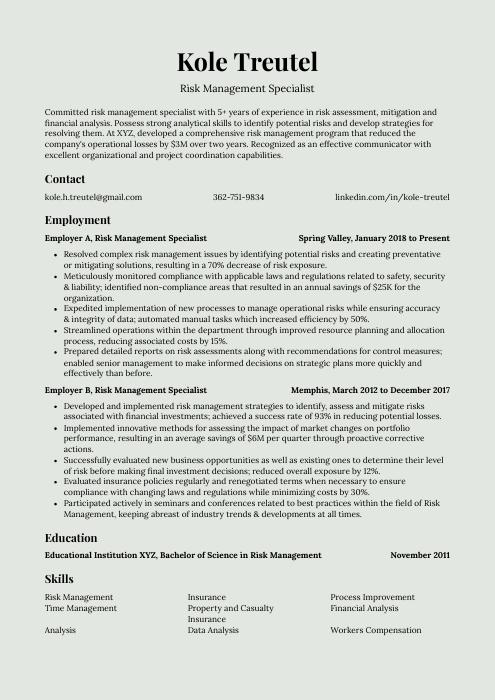 Saola
Saola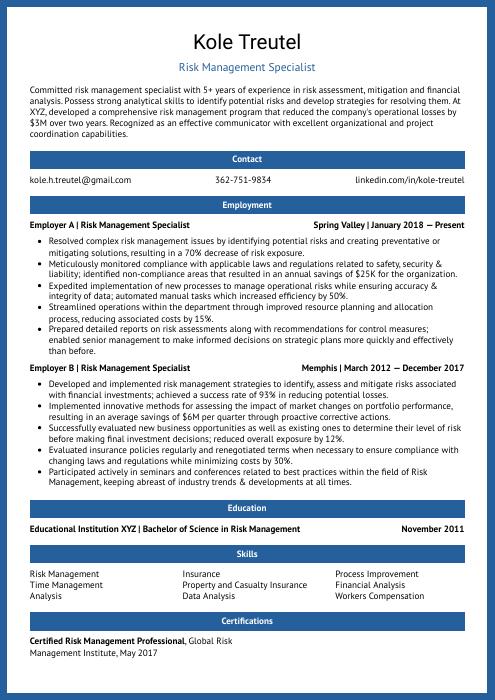 Ocelot
Ocelot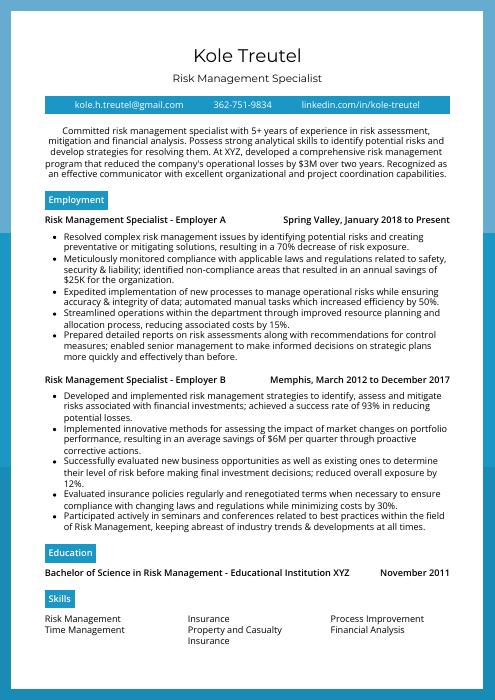 Rhea
Rhea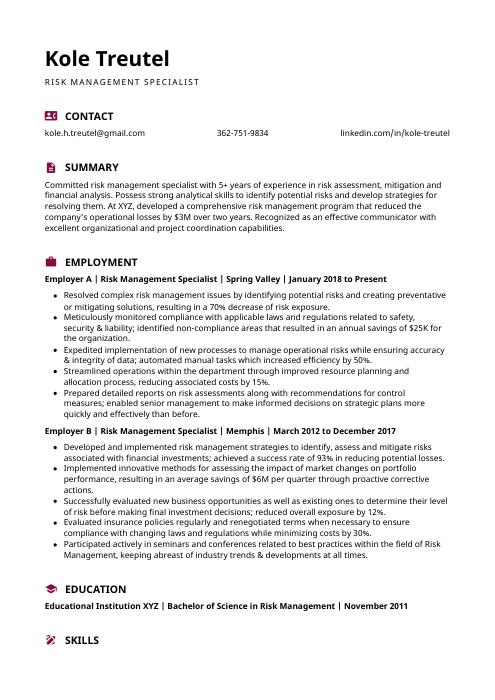 Hoopoe
Hoopoe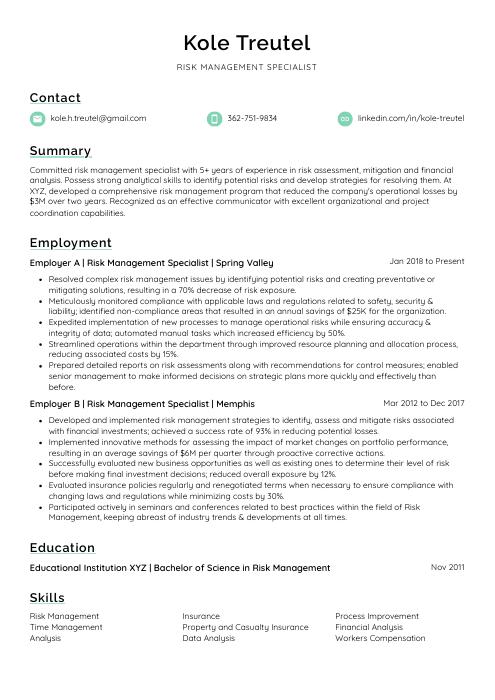 Lorikeet
Lorikeet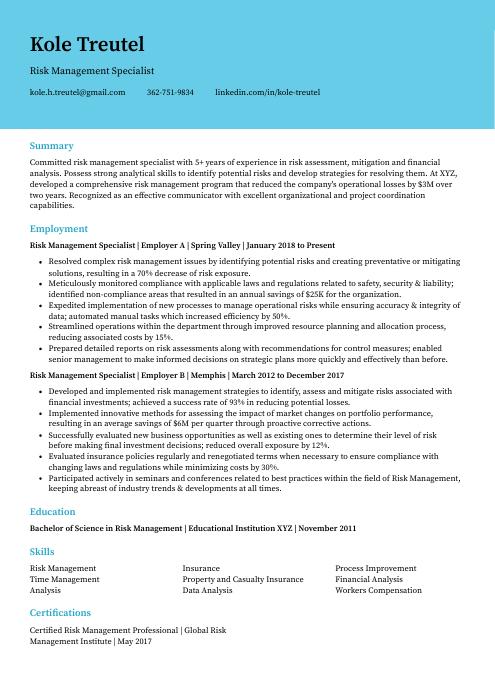 Dugong
Dugong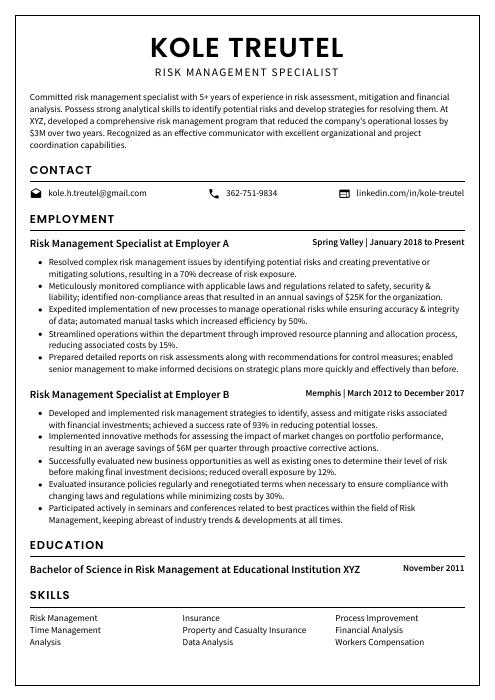 Cormorant
Cormorant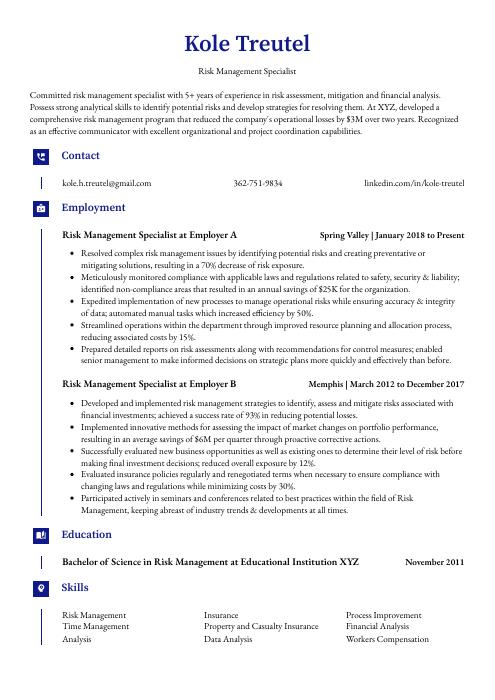 Gharial
Gharial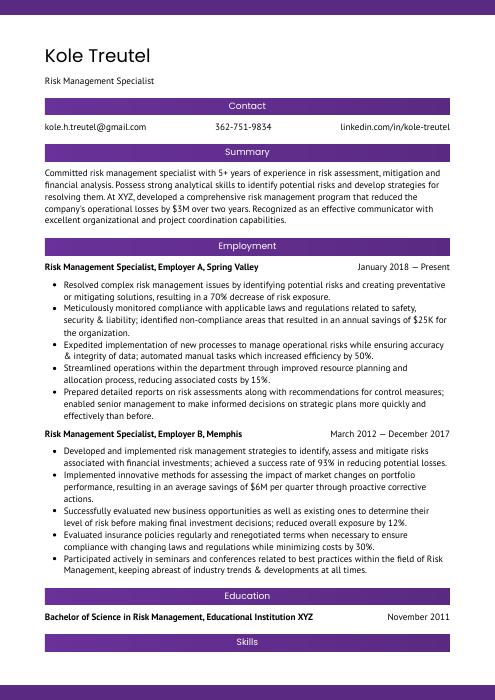 Jerboa
Jerboa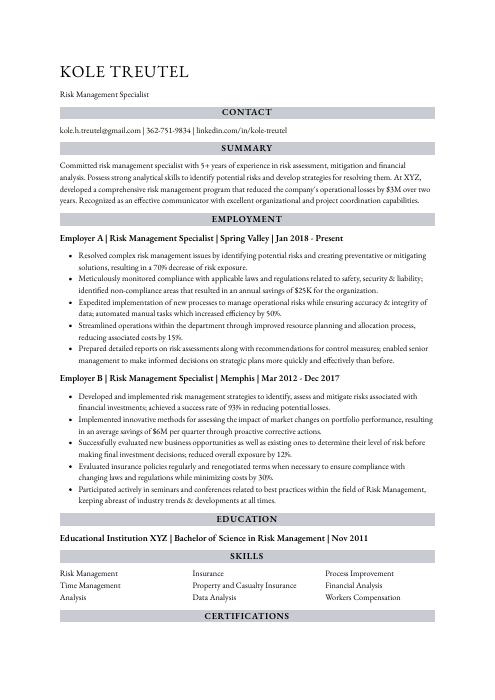 Numbat
Numbat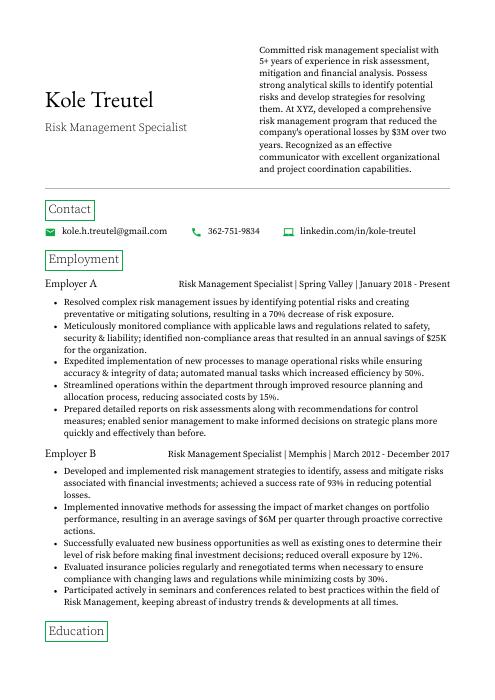 Quokka
Quokka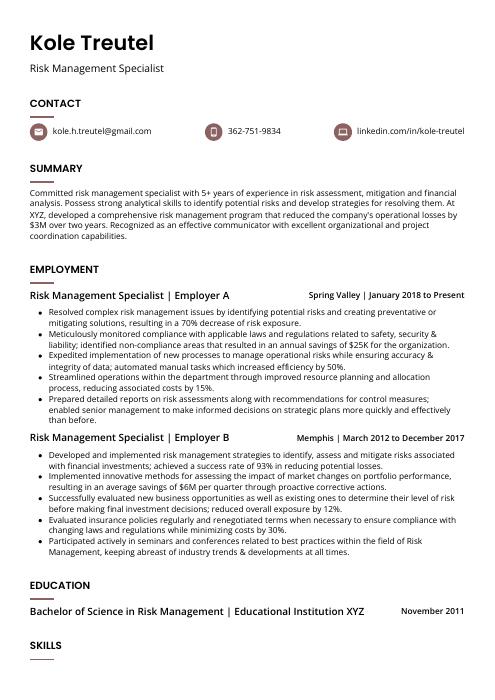 Fossa
Fossa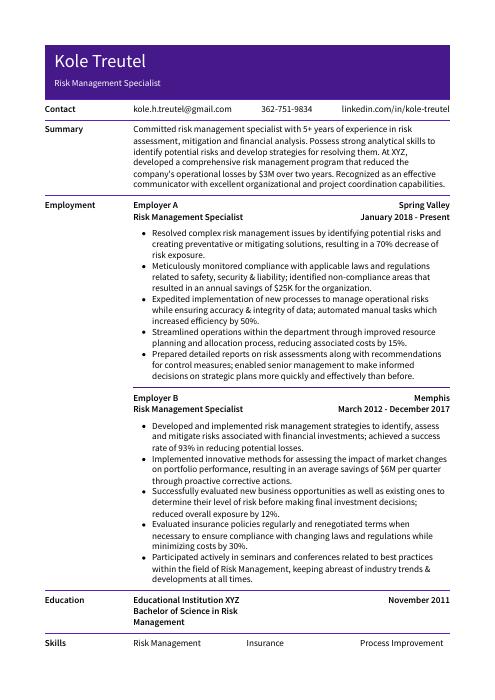 Pika
Pika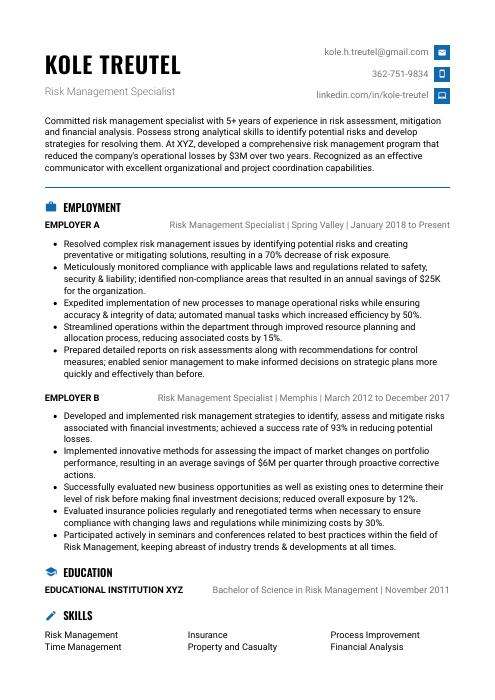 Echidna
Echidna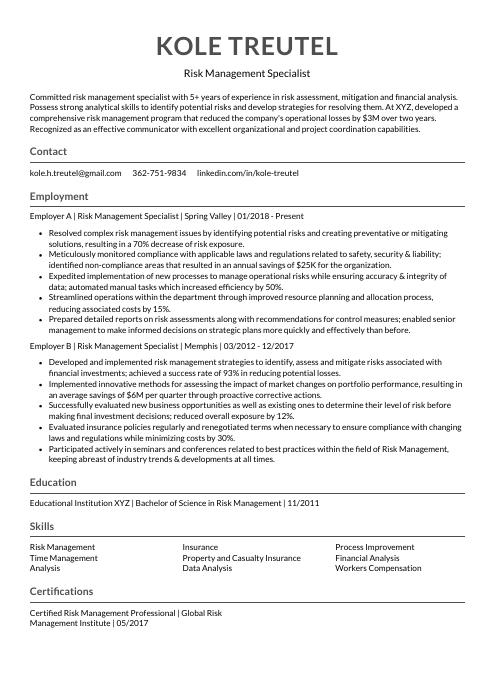 Indri
Indri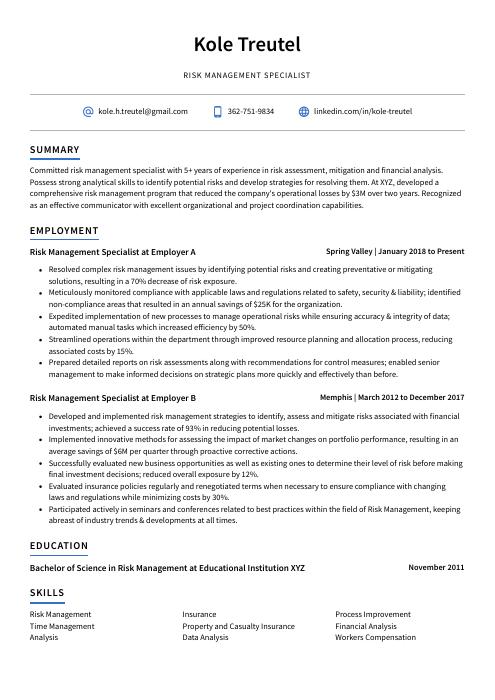 Axolotl
Axolotl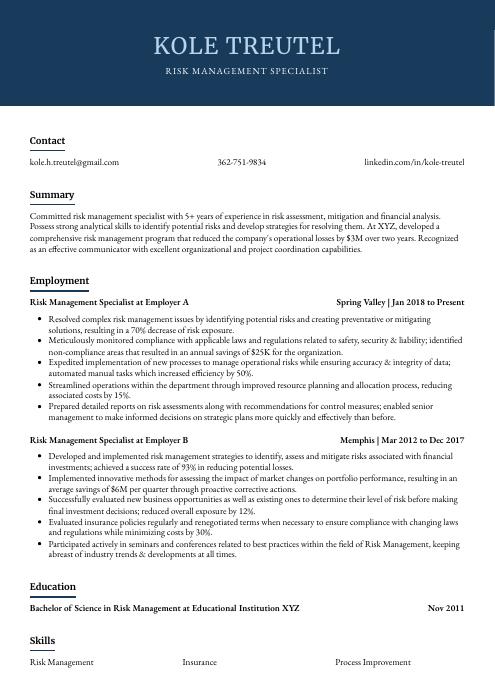 Bonobo
Bonobo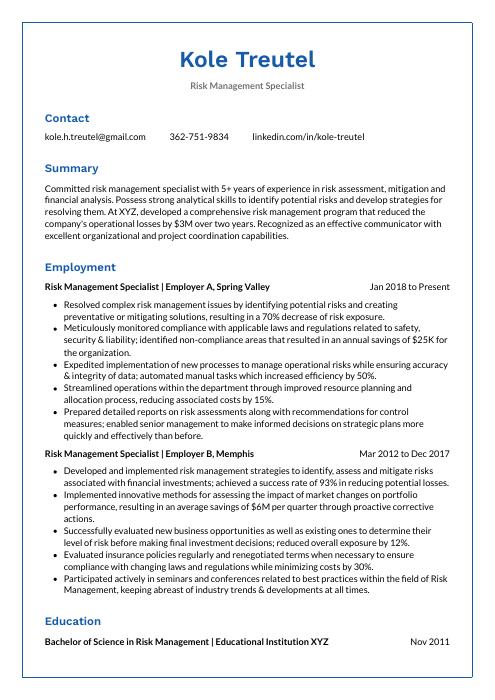 Markhor
Markhor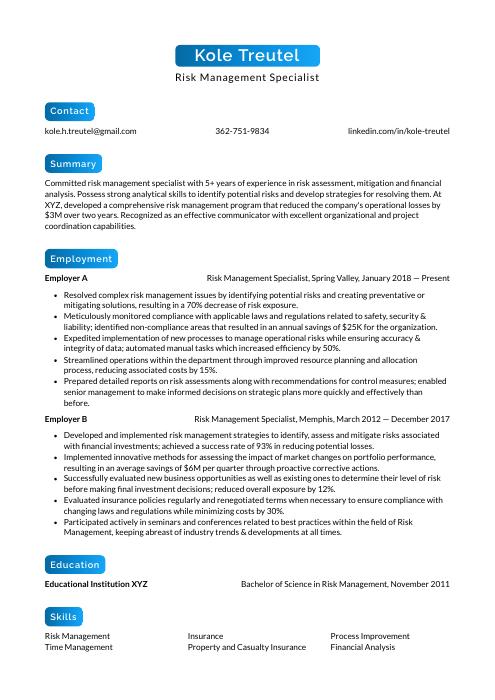 Kinkajou
Kinkajou Rezjumei
Rezjumei
